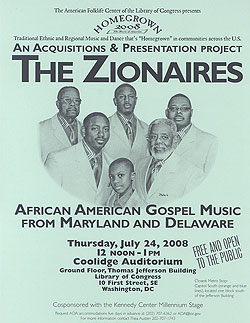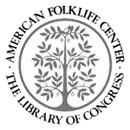| |
|||
|
The American Folklife Center at the Library of Congress presentsThe Homegrown 2008 Concert Series
|

|
The Zionaires were formed in 1954, by four young congregants of Mt. Hope African Methodist Episcopal (AME) Zion Church in Princess Anne, Maryland. For 54 years, they have harnessed their prodigious vocal talents for spiritual purposes.The group attributes its longevity to the words of King David in Psalm 146:2, as quoted above. The Zionaires originated as a vocal quartet with electric guitar accompaniment. The original lineup consisted of Dennis Brady, the late Marion Joynes, Hilton Johnson and Edward Davis. Over the course of five decades, some members left, others joined, and the remaining singers added additional instruments to their group. More than 40 musicians and singers have passed through the ranks of the Zionaires since 1954.
Bass vocalist and guitarist Dennis Brady, one of the group's founders, remains with the group today.The next senior member is O.Wendell Brooks, who first joined in 1967. Brooks' father Orville was a longstanding member of the internationally famous Golden Gate Quartet, whose urban jubilee style was enormously popular with black and white audiences in the first half of the 20th Century. The Zionaires have eschewed professional touring, choosing instead to remain close to family, church, and home. As such, they have never recorded commercially, and have focused their efforts on music ministry in churches. They perform at as many as three services a week, in churches where the music is often integrated with the sermon. They also appear at concert halls throughout the Delmarva region.
All African American gospel music, including the style played the Zionaires, is based on early Negro spirituals, ring shouts, circle dances, and field hollers, which were common to African Americans all over the South, including coastal Maryland and the Delmarva Peninsula. Most gospel music also has deep roots in the Piedmont blues style that has predominated in the American Southeast, from the Delmarva Peninsula to the Mississippi hill country
The specific style favored by the Zionaires has its immediate foundation in the blues-oriented gospel developed by Thomas A. Dorsey in the 1920s and 1930s. Dorsey was born in Atlanta and found fame in Chicago; his combination of the blues and 19th Century protestant evangelical hymnody has proved a powerful shaping force in Southern gospel music for nearly a century. Although he is often called "The Father of Black Gospel Music," however, his style owed a debt to both the Zionaires' church and their region of coastal Maryland.
The AME Zion Church, which was founded in 1796, played an important role in the abolition of slavery, counting two prominent Marylanders from the Eastern Shore - Harriet Tubman and Frederick Douglass - among its members. It was also the first church to publish a collection of songs specifically for a black congregation (1801), making it a pioneering church in black gospel music.
The Maryland influence on Dorsey was gospel songwriter Charles Albert Tindley (1856-1933). Tindley was born into slavery in the town of Berlin, near Ocean City, on Maryland's Eastern Shore. He was not a member of the AME Zion Church, but preached in other African American churches throughout the Delmarva Peninsula - in Odessa and Wilmington, Delaware and in Pocomoke and Fairmont, Maryland - as well as up along the New Jersey Shore, and in Philadelphia.Tindley's best-known compositions, "When the Storms of Life Are Raging, Stand By Me," and "We'll Understand It Better By and By," helped form the bedrock of African American church hymns at the end of the 19th century.These songs, which feature melodies that allow room for improvisation, as well as “blue” thirds and sevenths, served as the foundation upon which Dorsey built modern-day gospel music. The Zionaires are thus bringing the story full circle, taking Dorsey's more urban, modern gospel back to its roots.
That the Eastern Shore of Maryland was the birthplace of C. A. Tindley and the home of the Zionaires should come as no surprise to anyone familiar with Maryland's rich and vibrant gospel music culture, and with the blend of rural and urban gospel music that has predominated in the Delmarva region. "Singing and Praying Bands," a kind of group that emerged out of Methodist Camp Meetings and out of brush arbors where enslaved Africans held secret religious services, have been active in the Delmarva region since the time of slavery. More recently, the Chesapeake Bay has been home to such noteworthy African-American gospel groups as the Little Wonders of Havre de Grace. Some gospel groups in this region continue to practice a cappella, while others - like the Zionaires - perform with a full band.
The Zionaires have been an important influence on newer gospel groups in the Delmarva region, and are the senior members of the region's gospel music community. In February of 2009 they will celebrate their 55th Anniversary.
Clifford Murphy
Program Director, Folk & Traditional Arts
Maryland State Arts Council
Co-Director, Maryland Traditions
 The American Folklife Center was created by Congress in 1976 and placed at the Library of Congress to "preserve and present American Folklife" through programs of research, documentation, archival preservation, reference service, live performance, exhibition, public programs, and training. The Center includes the American Folklife Center Archive of folk culture, which was established in 1928 and is now one of the largest collections of ethnographic material from the United States and around the world. Please visit our web site.
The American Folklife Center was created by Congress in 1976 and placed at the Library of Congress to "preserve and present American Folklife" through programs of research, documentation, archival preservation, reference service, live performance, exhibition, public programs, and training. The Center includes the American Folklife Center Archive of folk culture, which was established in 1928 and is now one of the largest collections of ethnographic material from the United States and around the world. Please visit our web site.
| ||||
